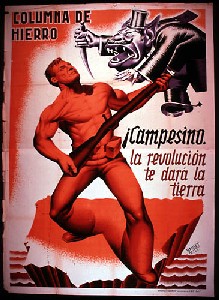
ANARCHIST COMMUNISTS: A QUESTION OF CLASS
2.3.
Spain (1936-1939; a project)
The Spanish Revolution was hurried on by the announcement of General Francisco Franco, forcing the workers' organizations (and in particular the CNT) to accelerate their programmes. But despite this, the Anarchist Communists (CNT-FAI) were not caught unawares. A few months previously during its congress in Zaragoza, the CNT had approved a programme for Libertarian Communism, which set out the path towards the achievement of a society of free equals. So, in those areas where its influence on the proletariat was greatest, they immediately began a series of collectivizations of land, industry and services which produced a rough sketch of a self-managed society with some noticeable results. It should be noted that the CNT was strongest in those areas, such as Catalonia, where economic development was most advanced, a fact which provides a strong argument against the fantastic theory of Marxists (which, besides, has no basis in theoretical analysis or historical research) that states that Anarchism can only establish itself in places which remain in a primitive state of development (peasants and small producers) and which would be eclipsed by progress.
By reason of its size and duration, the Spanish experience is comparable to that of Ukraine, but enjoyed without doubt much greater chronological and geographic continuity. So much so that today it represents the most valuable example of the realization of Anarchist Communism. This is not surprising in the light of what has been said above about the existence in the ranks of militants of a precise and detailed project and in the light of the long revolutionary preparation which the Spanish proletariat had accumulated at the time and, lastly, in light of the fact that the CNT represented not only the most radical, conscious wing of the proletariat, but was also the one which was best rooted among the masses.
So why the defeat? Let us leave aside for now any judgement on the entry into government by the better-known Anarchist militants, first in Catalonia, then in the central government. It may have been an error, but it certainly did not have a determining influence on events. First of all, because when these choices were made, the fate of the Republic was already on the cards and, secondly, though they may not have been able to guarantee success for the revolution, threatened by a section of the republican coalition itself (notably the Stalinists, who were at the time guarantors of the interests of the Spanish bourgeoisie and the Soviet state), they certainly did not in any way damage the social experiments under way, above all in Catalonia.
Without doubt the choice of the enemy to strike early played a considerable role, so much so that Zaragoza (where Anarchist Communists had their most consistent presence) was lost straight away. Divisions within the republican ranks also played their part, in particular the clever, but perverting, way in which the Partido Comunista Español was able to impose its "two halves" policy (first, victory in the civil war and only then the social revolution) even using force, turning its arms on the peasants' collectivity instead of on the external enemy.
All this cannot, however, explain completely what happened. The Anarchist Communists were prepared for events. They had a precise, detailed programme. They enjoyed wide influence among the proletariat. They had excellent, able militants. Even though they committed errors or seemed uncertain at times, this did not suffice to damage their initial advantage or the outcome of the revolution. Once again it was the factor of isolation (on an international scale this time) which was fundamental. The democracies around Spain, whether out of fear of the rising Nazi and Fascist aggression (which, it was hoped, could be placated through a policy of appeasement - for example Neville Chamberlain in 1938 in Britain) or out of fear of a possible spread of revolutionary conquests to their countries (for example in Léon Blum's France), limited themselves to verbal support and left the field open for military intervention in support of the Francoist rebels on the part of Italy and Germany. The USSR could not stand by and watch the birth of a new revolutionary pole for the international proletariat to gather round and was already on the way to making a treaty with the Nazis (the Ribbentrop-Molotov Treaty), which was signed at the same time as the fall of Madrid. Hence its formal support, without substance. Like many others, Anarchist Communists hurried to lend assistance to the Republic by joining the international brigades, but their help was in terms of manpower. They were unable to share their experiences, something which could have allowed the Spanish to use this experience to further their own struggle, mainly as a result once again of a lack of a general organization which alone could have protected the social revolution from choking to death.
It should also be added that the experience of the international brigades, with the armed clashes between the Anarchist Communists and Stalinists within the Republican forces, led to distorted conclusions in the libertarian movement. As a result, many militants, and with them the young people who were later attracted to Anarchism, developed a ferocious opposition (not backed up by careful analysis) to the communism which had been achieved in the Soviet Union and, as an extension of this, to Communism in the widest sense. Thus began a long slide which led to some preferring, of all things, Liberal Democracy and often deep-rooted, violent anti-Communism.